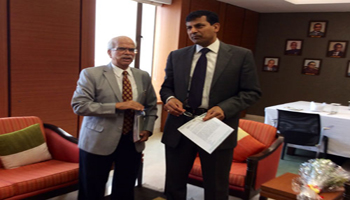
Congratulating Dr Rajan on behalf of the urban co-operative banking sector Dr Anhyankar used the opportunity to apprise him of the problems being faced by the UCB sector.
Dr. Abhyankar clarified that routine matters get sorted out by institutions like Standing Advisory Committee or State TAFCUB, but the broad policy issues need direct intervention by the top regulator i.e. governor himself.
Some of the major issues that Dr Abhyankar raised in the meeting included
(1)The first is regarding the ‘Vision Document’ and consequent MOU signed in 2005 between RBI and all State Governments. As per this MOU, the state level task forces were created and the problems & grievances of UCB sector were being considered through a consultative mechanism. But the experience of last 8 years is that RBI is looking to this consultative mechanism of TAFCUBs only to handle the non-disruptive exit of non-viable entities in UCB sector and nothing beyond’. Dr. Abhyankar stressed that re-thinking on this regulatory outlook is essential. Therefore, the issues like imposing penalties on the UCBs for regulatory violations etc. should also be placed in respective TAFCUBs for consultative mechanism in the TAFCUBs.
(2)Dr. Abhyankar also suggested few important and essential amendments in the Banking Regulation Act, 1949 necessary for UCBs. He especially pointed out amendments in Section 5 (cci), which at present defines that ‘co-operative bank means a state co-operative, a central co-operative and a primary co-operative bank’. This 3-tier structure in the entire co-operative sector has proved totally obsolete and irrelevant in the present context. This structure was evolved when the Agriculture Credit Department (ACD) of RBI was there in early 50s. But as of today, the national level bank i.e. Umbrella Organisation for the UCBs has become highly necessary. All important RBI committees such as V.S. Das Committee and Malegam Committee have strongly recommended creation of national level bank. However for want of necessary amendment to Section 5 (cci) in B.R. Act it cannot be created. Therefore Dr. Abhyankar demanded following amendment to this section. ‘Co-operative bank means ‘a national co-operative bank, state co-operative bank and primary co-operative bank’. Central co-operative bank concept is no more necessary because it is regulated more by NABARD than RBI.
Another suggestion, which is being felt important by UCB sector, is the definition of ‘primary co-operative bank’ as laid down under Section 5 (cci)(3) of Banking Regulation Act. The extant definition says “primary co-operative bank means a co-operative society, the bye-laws of which do not permit admission of any other co-operative society as a member”. Because of this restriction, the UCBs cannot lend money to housing co-operative societies or co-operative manufacturing industries life IFFCO, KRIBHCO or AMUL. Dr. Abhyankar tried to impress that the money in the co-operative sector should remain in the co-operative sector both ways – Deposits as well as Loans. Therefore this amendment is highly necessary in current banking scene.
(3)The third point insisted by Dr. Abhyankar is a ‘Special Dispensation’ needed for north eastern states of India. At present, there are only 17 UCBs in north eastern states where much more proliferation of banking services to common man and lower strata of population is needed. Because the UCBs are more customer friendly and doing financial inclusion in a bigger way as compared to commercial banks, special privileges should be provided to the UCBs there. Similarly, the large UCBs should be encouraged to extend their area of operation and branch net-work in north eastern states without any formality.
(4)Dr. Abhyankar also requested Dr. Rajan to address one plenary session in the forthcoming 10th National Conference of Urban Co-operative Banks & Credit Societies to be held in New Delhi in January/February 2015. He earnestly appealed to the governor that during last nine National Conferences no RBI governor has ever addressed the delegates and therefore he urged on Dr. Rajan to kindly accept to be there and talk to the delegates. Dr. Rajan readily agreed and asked for the dates of the Conference, to which Dr. Abhyanakr replied that the dates will be available from the Prime Minister Shri. Narendra ji Modi within next few days and shall be intimated to Dr. Rajan.
While closing the discussion, Dr. Abhyankar also suggested that some large size but sick UCBs like Rupee Co-operative Bank in Pune are facing cancellation of licences. No other UCB is in a position to absorb big losses of more than Rs.500 crore and therefore, not ready for merger. If Rupee Co-operative Bank is de-licensed, the entire UCB sector will face ‘Tsunami’ and many other small & medium UCBs may have to face a run of depositors. Therefore, Dr. Rajan as Governor should find out some innovative way to save Rupee Bank from extinction. Dr. Rajan assured to consider this by consulting the BSF and his senior colleagues.